Village Board Hears Feedback on Proposed Budget
- Details
- Hits: 4226
 Driving rain didn’t deter residents from attending the first meeting of the newly elected Scarsdale Village Board of Trustees on Tuesday April 12th. The session included public comment on the Village budget, the announcement of appointments to Boards and Councils and liaison assignments, an update on the Popham Road bridge and approval of a downtown art fair in May.
Driving rain didn’t deter residents from attending the first meeting of the newly elected Scarsdale Village Board of Trustees on Tuesday April 12th. The session included public comment on the Village budget, the announcement of appointments to Boards and Councils and liaison assignments, an update on the Popham Road bridge and approval of a downtown art fair in May.
Mayor Fliisser commented on the process of Village government, noting that she has heard from residents that televised Village Board meetings seem formal and dry, She explained that Board meetings are a result of work done at committee meetings and by Village staff. She encouraged those who want to get involved to attend these committee meetings -- that are open to all. At these meetings residents can speak and let the Board know what they think.
Public comment to the Board on the proposed 2011-12 Village Budget was given by Sara Werder, President of the Board of Trustees of the Scarsdale Library, Bill Kaye from the Scarsdale Forum Fiscal Affairs Committee, Pam Rubin of the Scarsdale League of Women Voters and Dan Hochvert for the Scarsdale Forum Sustainability Committee.
Werder warned that by complying with the Village request to cut the library budget by $93,000, the Board was forced to cut back on service to Scarsdale residents. Both staff hours and the book-buying budget has been reduced and the Board elected to take $60,000 out of reserves to fund their annual budget.
Speaking for the Scarsdale Forum Fiscal Affairs Committee, Bill Kaye provided recommendations on reducing the Village Budget but did endorse passage of the budget as proposed.
Among their suggestions for cost reductions were:
- Require non-tax paying entities such as religious institutions to pay for refuse collection and requiring commercial facilities such as country clubs to pay more than residential properties for collection.
- To seek methods to deliver services more cost effectively for the long term.
- To reduce the Village staff headcount through attrition -- as 70% of the Village budget is comprised of salaries in benefits
- To renegotiate contracts with Village employees to reduce salaries and benefits and to require employee contribution to healthcare.
- To lobby N.Y.S. to reduce unfunded mandates and continue to work with municipal workers and NYCOM to reduce pension contributions.
The Scarsdale Forum also called for the Village wide tax revaluation to be done this year. Kaye noted that this report was submitted in memory of friend and colleague Boine Johnson who passed away earlier this year.
Pam Rubin spoke on behalf of the Scarsdale League of Women Voters and commended the Village staff, Trustees and former Mayor Carolyn Stevens for maintaining “quality of life” while containing the tax rate.
The League offered the following recommendations:
- Consider the reallocation of resources – such as crossing guards who are no longer needed for midday dismissal, as Kindergarten is now a full-day program
- Move forward with the Village–wide tax revaluation
- Explore outside revenue sources and cooperative agreements with neighboring municipalities to fund capital improvement projects on the storm water drainage system and sanitary sewer lines.
- Continue to fund road repair, as 25% of Scarsdale roads are now classified as “poor.”
- Replace Village trees lost to storms and disease
- Work with community groups to determine which services can be reduced, eliminated or paid for by alternative means.
Dan Hochvert the spoke as a co-chair of Scarsdale Forum’s Sustainability Committee. He commended the Village for reducing costs for recycling and noted that the County will now recycle plastics in categories #3-7. He urged the Village to publicize this change in policy.
He also spoke about the benefits of composting to further reduce waste disposal fees and suggested that a composter be set up at the Famer’s market and that residents compost their leaves rather than have them collected. The Village currently spends $705,414 on leaf collection – and this cost could be reduced if residents composted leaves.
Popham Road Bridge Project: Deputy Village Manager Steve Pappalardo announced that Phase II of the renovation of the Popham Road Bridge was scheduled to begin. This will involve work on the south side of the bridge. During this phase, one lane of traffic will be closed and the south lane of the bridge will become a sidewalk. Drivers will not be able to make a left turn off the bridge onto East Parkway and will now have to go to Chase Road to turn left. The bridge is tentatively scheduled to be completed at the end of May 2012.
Art Festival: Lewis Arlt spoke on behalf of Chamber of Commerce to encourage the Board to approve an application for the Westchester Festival of the Arts by Paragon for May 14-15, 2011.He explained that this would be the sophomore year of the event and the miscalculations made last year would be corrected. Last year the fair was held on Father’s Day and all Village streets were closed to vehicular traffic. In addition, artist’s booths blocked storefronts and prevented shoppers from entering.
This year these problems have been addressed. The fair will be held on May 14-15, a non-holiday weekend, it will be moved to the Merchant’s Lot and no booths will be placed in front of store windows. The Scarsdale Art Association will also hold their show in Chase Park that same weekend.
The Board subsequently voted to approve both Art Fairs for the weekend of May 14-15.
Mayor Flisser and the Board then announced Board and Committee appointments and assignments for the coming year. This lengthy roster can be viewed on the Village website here
Flisser also noted some upcoming meetings … among them a Land Use committee Meeting on Thursday night April 14 to discuss a proposed land sale at 2-4 Weaver Street. However, this meeting is expected to go into Executive Session, and in that case, it will be closed to the public.
Do It Yourself Mailing in Scarsdale Village
- Details
- Hits: 3998
 No more waiting online at the post office at 29 Chase Road in Scarsdale Village. A new automated postal center has now been installed in the post office allowing customers to send packages and letters and purchase stamps without waiting online for customer service.
No more waiting online at the post office at 29 Chase Road in Scarsdale Village. A new automated postal center has now been installed in the post office allowing customers to send packages and letters and purchase stamps without waiting online for customer service.
These new, user-friendly machines do almost everything. You can pay for a box, weigh it, calculate and purchase postage for parcels up to 70 pounds and even buy insurance for your shipment.
In Scarsdale, since the post office is often open even when the customer service window is closed, you can now take care of all of your postal needs in the off-hours. Valerie Jackson, the supervisor of the Scarsdale branch pointed out that the building is open on weekends for those who have mail to pick up from post office boxes on the site.
The next time you’re in the Village, stop buy and put the new machine to the test.
Sherwood is Honored at the 2011 Scarsdale Bowl Dinner
- Details
- Hits: 6177
 The atmosphere was warm and festive at the 2011 annual Scarsdale Bowl Dinner at Lake Isle Country Club on April 6. This year’s honoree, Emily Sherwood, is a beloved member of the community and her wide network of friends and supporters came out in force to celebrate her service to Scarsdale.
The atmosphere was warm and festive at the 2011 annual Scarsdale Bowl Dinner at Lake Isle Country Club on April 6. This year’s honoree, Emily Sherwood, is a beloved member of the community and her wide network of friends and supporters came out in force to celebrate her service to Scarsdale.
The room overflowed with present and former Mayors, Village Trustees, School Board members, and participants in the many activities, causes and committees on Emily’s lengthy resume. Also on hand were three of the Sherwood’s four children, her husband, mother, and family friends. The 2011 Bowl Committee should be credited with identifying an honoree who has touched so many lives in a meaningful way.
The 2011 Chair of the Bowl, former School Board member Rita Golden, offered welcoming remarks and Rabbi Rick Jacobs gave the invocation. He told the group

2010 Bowl Winner Jackie Irwin briefed the room on the work of the Scarsdale Foundation and asked the community to be generous with college scholarship support for Scarsdale students. The Foundation provides need-based scholarships to those entering their sophomore, junior and senior years, and last year awarded $76,000 to 24 students. Sherwood serves on the Board of Trustees of the Foundation. Irwin recognized Nancy Michaels who has served as the secretary/treasurer of the Bowl for three years and presented her with a gift.

All kidding aside, he told the group how thankful he was to have her as a role model and marveled out how many friendships she maintained while juggling a dizzying array of commitments. He ended by telling the group that "my Mom has more Facebook friends than I do!"
Her first-born son Matt continued a family tradition and wrote a poem about the honoree. Speaking in verse he called Sherwood a real life superhero with rippling

“She has a Penn education and a phd,
But she could have used an engineering degree”
And ended with,
“You’ll continue to strive higher.
This won’t be the last time we see your face in the Scarsdale Inquirer.”
Next, she was given a humorous and heartfelt toast by three colleagues from the Board of Education; Florie Wachtenheim, Terri Simon, and Bob Steves.

Rita Golden then presented Sherwood with the Scarsdale Bowl, and Emily took the podium. She said she was “totally overwhelmed” and thanked Rabbi Jacobs, her sons, her family, her fellow Board members, the Bowl Committee and Rita Golden. Sharing the limelight with the audience she said, “There are dozens and dozens of individuals who qualify for this Bowl award because of your tireless activities to make our village and schools better -- and indeed – this is an evening that celebrates the accomplishments of our entire volunteer community."
She said that “collaborative decision-making” is done well in Scarsdale, and that the non-partisan system is the ultimate model of collaboration. Referring to the
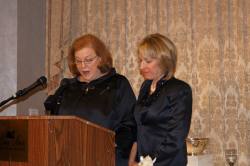
Sherwood encouraged all to give their time and told the group that she had “received so much more in return for volunteering in Scarsdale than I could possibly have given.”
The evening was a wonderful celebration of Sherwood, Scarsdale and all the volunteers that work endless hours for the community.
The 2011 Scarsdale Bowl Committee
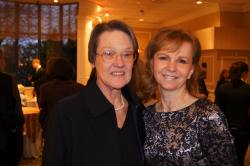
Rita Golden, Chair
Jane Buck
Matthew Callaghan
Marc Carter
Jonathan Drescher
Malula Gonzalez
Liz Gruber
Joyce Hirsch
Carolyn Mehta
Laurence Mintzer
Anne Moretti
William Natbony
Robert November
Seth Ross
Tara Smith Tyberg
Non-voting
Jacqueline E. Irwin, Ex Officio

Nancy Michaels, Secretary/Treasurer
It's Official: Scarsdale Swears In New Mayor and Trustees
- Details
- Hits: 7309
 Miriam Levitt Flisser was sworn in as Mayor of Scarsdale on Monday April 4th at Scarsdale Village Hall. Village Clerk Donna Conkling administered the oath to Dr. Flisser and three recently elected Village Trustees; Robert Steves who will serve his second two-year term, as well as Stacey Brodsky and Robert Harrison who were sworn in to serve two-year terms.
Miriam Levitt Flisser was sworn in as Mayor of Scarsdale on Monday April 4th at Scarsdale Village Hall. Village Clerk Donna Conkling administered the oath to Dr. Flisser and three recently elected Village Trustees; Robert Steves who will serve his second two-year term, as well as Stacey Brodsky and Robert Harrison who were sworn in to serve two-year terms.
Friends, family, Village staffers and well-known faces from around the county came to witness the ceremonies. County Executive Rob Astorino and Greenburgh Town Supervisor Paul Feiner were on hand as well as several former Scarsdale Mayors and past Village Trustees.
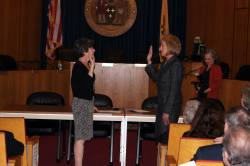
Flisser vowed to serve seriously and joyously and to continue to “make Scarsdale a beautiful place to live.” Referring to her heritage as the child of Holocaust survivors, Flisser said, “I represent the parents of a million children who were unable to protect them and bring them to this day.”
The mood was both solemn and hopeful as observers put aside differences that arose during the contested election, celebrated Scarsdale’s new leadership and set their sights on a bright future for the Village.
(Pictured Above: Mayor Miriam Flisser and County Executive Robert Astorino)
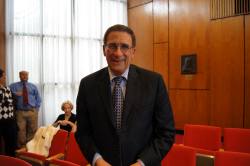
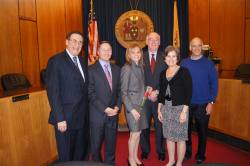

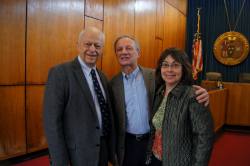
Trash Talk, Shady Roofer and Missing Jewels from the Scarsdale Police
- Details
- Hits: 5074
 Missing Jewels: On 3/23 a Crawford Road woman reported that jewelry valued at $13,000 had disappeared from her home when she was in the hospital between November 1 2010 and January 5, 2011. The jewelry had last been seen in a locked cabinet in her bedroom but the key to the box was kept in the kitchen. The woman will provide photos of the missing jewelry to police.
Missing Jewels: On 3/23 a Crawford Road woman reported that jewelry valued at $13,000 had disappeared from her home when she was in the hospital between November 1 2010 and January 5, 2011. The jewelry had last been seen in a locked cabinet in her bedroom but the key to the box was kept in the kitchen. The woman will provide photos of the missing jewelry to police.
Arrests: On the night of March 22nd, Silbert Gray Jr. of the Bronx was picked up in the Bronx for a traffic offense. When police checked his license they found that there was an outstanding warrant for his arrest in Scarsdale since 2006. Gray was transported to Scarsdale and arrived after midnight on 3/23. He was processed, released and given a court date of 3/30/11.
Anthony J. Rodriguez, age 21 of Bronxville appeared at Village Hall on March 25 to clear up an outstanding arrest warrant. Rodriguez was taken to police headquarters where he was processed and released on $100 bail, pending a 3/30 court date.
Fraud: A 92 year-old Greenacres woman appears to be the victim of fraud on the part of a roofer. A caregiver for the elderly woman found a receipt for a $2,400 withdrawal from the woman’s Chase account. When she asked about it, the woman said she had no memory of making the withdrawal. The old woman suffers from short-term memory loss. The caregiver asked questions at the bank and a teller reported that a bald man, claiming to be her roofer, accompanied the woman to the bank while she withdrew the funds. The teller asked the man for his business card and he said he would bring one in from his car but he never did. The woman no longer drives after she had a serious accident last year and her children live far away. Her children have taken away her personal checks in the past. Police will follow-up to assess her ability to care for herself.
A Foxhall Road man came to police on 3/23 to report that he received a collection notice for a debt he had not incurred. The notice was from Sunrise Credit Services and it said that the man owed $267.95 to Cablevision. The man told police that he was up to date with his payments to Cablevision. The collection agency was trying to collect the debt from a customer with another name, but with the same social security number as the Scarsdale man. Cablevision believes that someone used the Scarsdale’s mans social security number to open a fraudulent account.
Dog bite: A Fox Meadow mother came to police headquarters on the afternoon of 3/24 to report that a dog bit her son at the Fox Meadow school field on 3/20. Her son was riding his bicycle when a gold and white dog named “Dunkin” chased him. The boy fell off his bike and the dog bit the boy’s upper thigh. The bite punctured the skin and caused bruising and swelling. The dog’s owners supplied up-to-date vaccination papers.
Trash: A Nelson Road man complained that kids had thrown garbage out of the window of a 2000 Honda Civic onto his property on the afternoon of 3/25. The man identified the kid who was driving and police found that the garbage was from McDonalds. Police went to SHS and spoke to the young man who was driving the car. He admitted to throwing the garbage and was a given a summons. The boy identified the passenger in the car and said, “We both did it.” Police found the second young man who also admitted throwing the garbage and claimed they “thought it was funny.” He was also given a summons. Fred Goldberg, Assistant Principal was notified and he said that he would contact the boys’ parents.
A Butler Road man reported that the drivers of a silver vehicle had placed four bags of yard waste on his property at noon on 3/21. The man had the license plate number of the car and police identified the driver as Thomas Darby of Congers, New York and tracked him down. Darby came to headquarters and admitted to leaving two bags of refuse on Butler Road. The waste came from the Verizon substation off Locust Lane. He agreed to properly dispose of the waste.
Trouble: The counselor at a residential home, Search for Change on Post Road reported that a resident had created a disturbance and left the house on foot on the evening of 3/22. Police found the woman on the Post Road and she was calm. However, due to problems she was having with other residents in the house, the counselor did not want her back in the house. The woman contacted her mother who came to pick her up, signed her release and took her into custody.
A young man from Scarsdale came to police on 3/26 to complain that he was receiving annoying text messages from two people and wanted them to stop. He said that there was a history of antagonism between him and the two texters. Police called the two and instructed them to cease.
A Colvin Road woman called police at 5 am on Monday for help restraining her husband. The man has mental illness and wanted to go out and visit. Police went to the home and convinced him to remain inside.
Locked in: A Yonkers woman locked her three-year-old son and her keys inside her car on Chase Road on the afternoon of 3/26. Police called the Heathcote Gulf station and they sent someone who was able to unlock the car.
Animals: A Woods Lane resident called police to report that birds were flying around inside the house at 8 am on Sunday 3-27. Police went to the home, opened the windows and the birds flew out.
A man accidentally ran over his own dog at a Brookline Road home on Sunday afternoon 3-27.






